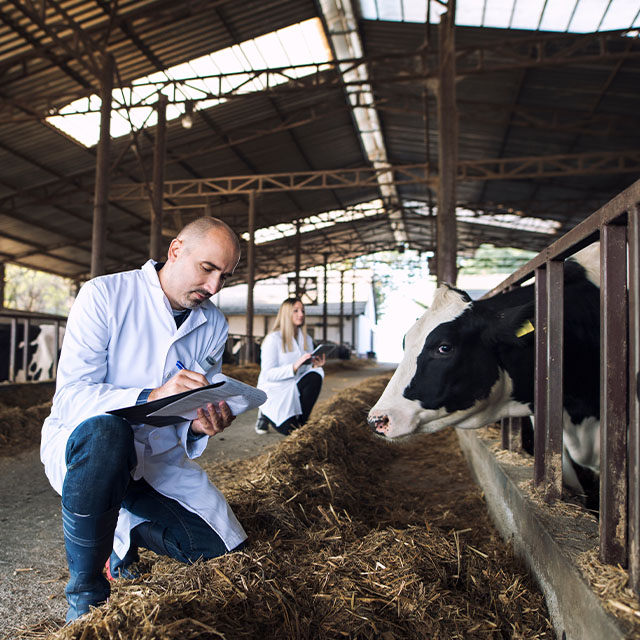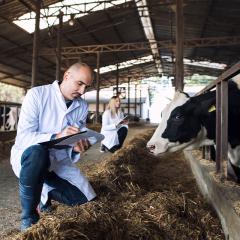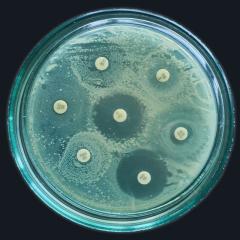Reducing the burden of infectious diseases by applying multidisciplinary and collaborative research to craft innovative, translational solutions.
Our group is focused on applying medicinal chemistry to the discovery of translational solutions to antimicrobial resistance.
We work on developing new antibiotics, novel non-antibiotic therapies, diagnostics, and basic research tools to help understand the interactions between antibiotics and resistant bacteria.
While our emphasis is on bacterial infections, we are also exploring solutions to fungal, parasitic and viral diseases.
Key breakthroughs & discoveries
- Discovery that cannabidoids such as CBD are a potential new class of antibiotics with activity against many Gram-positive bacteria including MRSA and a select subset of Gram-negative bacteria such as N. gonnorhoeae (Communications Biology, 4 (1) 7, 1-18. doi: 10.1038/s42003-020-01530-y)
- Discovery that metal-containing complexes are a rich and unexplored source for new antibiotics (Chemical Science (2020) 11, 2627-2639 doi: 10.1039/C9SC06460)
- Discovery and development of a new 'supercharged' class of glycopeptide antibiotics effective against resistant Gram-positive bacteria (Nature Communications, (2018) 9, 22 and WO 2015/117196-A1 “Antibacterial Agents”
- WO/2019/084628 “Peptide Antibiotics”, Cooper, M.; Blaskovich, M.; Gallardo-Godoy, A., Hansford, K., Elliott, A. -new lipopeptide ‘last resort’ antibiotic for highly drug resistant Gram-negative bacteria
- WO/2018/102890 “Visualisation Constructs”, Blaskovich, M., Cooper, M.; Butler, M.; Stone, R.; Phetsang, W. – new probes to visualise bacteria
- WO/2018/102889 “Glycopeptide Antibiotic Constructs”, Blaskovich, M.; Cooper, M.; Ranzoni, A., Phetsang, W.; Hassan, M. P - functionalised antibiotics to develop new dignaostics
- WO 2015/117196-A1 “Antibacterial Agents” . Cooper, M., Blaskovich, M. – novel ‘supercharged’ glycopeptide antibiotic for Gram-positive bacteria
Our facilities & services
- Full synthetic and medicinal chemistry services
- A suite of microbiological assays, ranging from simple in vitro MIC assays through to mouse in vivo infection models.
- Screening for antimicrobial activity via the Community for Open Antimicrobial Drug Discovery (www.co-add.org)
Group leader

Professor Mark Blaskovich
Group Leader, Superdrugs vs Superbugs
Director of Research Translation, IMB
+61 7 334 62039
m.blaskovich@imb.uq.edu.au
UQ Experts Profile

CEAStAR to target antimicrobial resistance
The Centre for Environmental and Agricultural Solutions to Antimicrobial Resistance (CEAStAR) was established to build Australia’s capability in addressing AMR.
In collaboration with industry, the Centre will train the next generation of antimicrobial research scientists.
The Centre’s research programs will investigate novel new antimicrobials, explore ways to improve the health of livestock without the use of antibiotics, and identify, remove and/or treat contamination in the environment.
Our approach
Our research is anchored in medicinal chemistry, which is at the core of all our research themes. I believe strongly in the strength of multidisciplinary and collaborative research, leveraging the expertise of national and international investigators in a wide range of fields to jointly develop solutions to the urgent threat of antimicrobial resistance. We are focused on developing translational outcomes, with real-world impact.
Research areas
New antibiotics
- Anti-bacterial, anti-fungal, and anti-parasitic projects
- High throughput screening
- medicinal and synthetic chemistry
- machine learning and chemoinformatics approaches
- peptidomimetic drug design
- microbiological characterisation
- mode of action studies
- drug formulation
Non-Antibiotic Alternatives
- potentiators
- antibody-drug conjugates
- immune-stimulating therapies
- virulence factors
- lysins
Antimicrobial Diagnostics
- antibiotic-derived fluorescent probes for fundamental investigations into bacterial resistance
- flow cytometry characterisation of bacteria
- imaging diagnostics: fluorescent 'bacteria paint', PET and SPECT radiolabeled agents, magnetic particle imaging
- derivatised nanoparticles for bacterial capture and detection
Latest news
-
-
How do bacteria actually become resistant to antibiotics?
8 November 2023 -
New antibiotics on the way – but not quickly enough
25 July 2023
General enquiries
+61 7 3346 2222
imb@imb.uq.edu.au
Media enquiries
IMB fully supports UQ's Reconciliation Action Plan and is implementing actions within our institute.
Support us
Donate to research
100% of donations go to the cause













